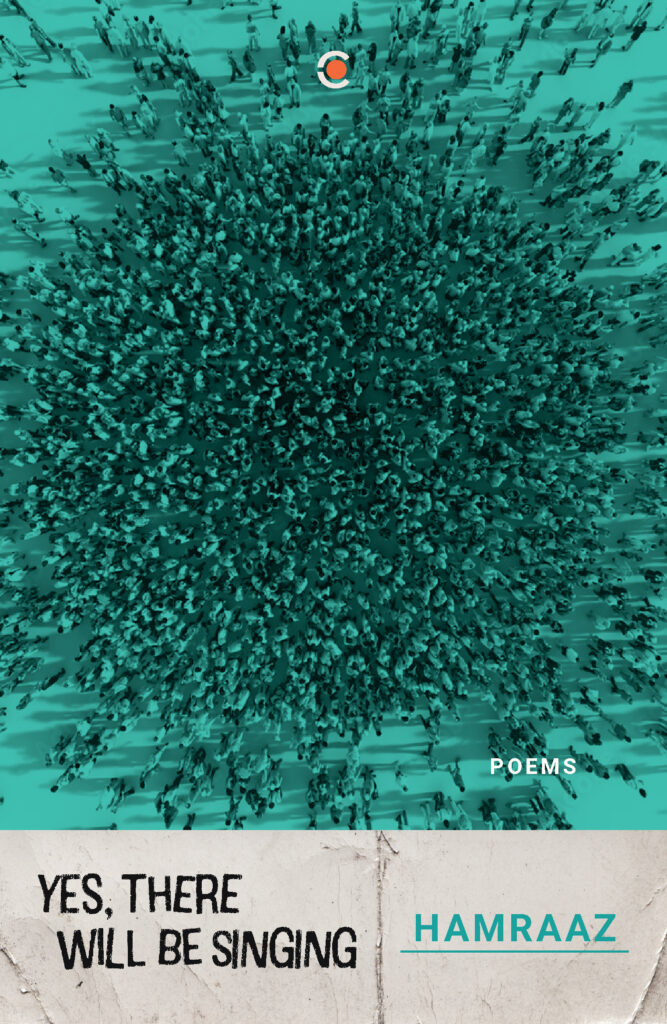Press and Reviews for Yes, There Will Be Singing:
In The Book Review (September, 2024), Smita Agarwal writes:
As confidant, this poet urges us to travel into our individual and social psyches to figure out the shadow world of just how justice crosses over to injustice, power becomes discriminatory, authoritarian, oppressive and truth—manipulative and obscure. A gentle voice, authentic and courageous explodes into our consciousness like the image depicted on the cover: human presence and the voice of the collective bursting like a blue, blue sunflower.
Writing in Outlook (April 6, 2022), Saurabh Sharma writes:
Two takeaways from what Aizenman reflects. First, in trying times, imagination fails everyone, including—and surely—artists, too. Second, regardless of the oppression that comes in their way, artists must create artforms—to register their dissent, to warn people of an eventuality that’s lost on them, to give a ray of hope. That’s precisely what Hamraaz’s poetry collection, Yes, There Will Be Singing (Context, an imprint of Westland)—a perfect blow to the state-sponsored oppression—does.
…Divided into nine sections, the structure enables the poems in this collection to deftly encapsulate the paranoia of our recent past and present times. Be it the anti-CAA-NRC protests in Shaheen Bagh, Jantar Mantar, and India Gate or be it the successive waves of the coronavirus pandemic, each recollection sends a chill down one’s spine.
Full review here.
From Mid-Day (April 7, 2024):
...[the] poems speak of rage, but also of hope; of despair, but also of love. The verses, some short, some longer—80 in all—address old questions, while offering new perspectives. The subjects are all too familiar: Shaheen Bagh, the farmers’ protest, and the arrests of individuals like Umar Khalid, Father Stan Swamy and Varavara Rao. But with each poem, Hamraaz (Urdu for “confidante”), as the poet prefers to be called, makes the reader wonder, “Why didn’t I think of it this way?”
Full article, including an interview, here (They got my pronouns wrong, but I don't complain about good press.)
From Frontline (March 21, 2016):
An ode to personal courage and public protest, a deep dive into the Bhima Koregaon case, and much more.

Publications:
‘We Have Been Here Before’ is in Scroll.in
‘Tremble’ and ‘Like That Cat or Our Constitution’ are in Pen America’s India At 75.
Hamraaz has 13 poems in The Penguin Book of Indian Poets edited by Jeet Tayil. Buy it in Delhi at Midlands or use google.

‘We Have Been Here Before’ and ‘This Number Does Not Exist’ are in nether Quarterly (vol. 2, issue 3).
‘I Fall Asleep Reading a Poem by Akhil Katyal’ (for Natasha Narwal) is in Rattle’s Poet’s Respond.
‘Hard Fruit’ is in The Alipore Post. (Artwork by Marina Marinksy)
‘We Must Insist on Saying Unspeakable Things’ is in The Wire.
‘Abrogated’, ‘In the Beginning’, ‘Hard Fruit’ and ‘In the Beginning’ are in The Sunflower Collective.
Sumedha Bhattacharyya (@kathagrapher) translated ‘Lockdown Lullaby‘ into dance. You can see it here.
Earlier Press:
Since the release of The Penguin Book of Indian Poets, Hamraaz is finally getting some press.
In 'How an anonymous poetry page is bringing hope to political activism', (Scroll.in), Yamini Krishnan writes: The cultures that Hamraaz’s poems contain are strongly rooted in the physical space of the city, bringing a sense of immediacy to the urgency of political expression and political freedom. By situating the reader within a familiar, seemingly mundane situation, Hamraaz places politics in the everyday – on a street in Delhi or a friend’s balcony. It's a lovely, long piece. Please do check it out. From 'Jeet Thayil and Ranjit Hoskote on Indian Poetry' in Open Magazine: JT: ...Take a poet like Hamraaz. We don’t know whether the poet is male or female, where they are based. We can make guesses. Hamraaz’s work is so specifically addressed to this particular Indian moment. Yet it has aspects that are timeless. I believe the poems will be relevant in ten years. When I look at the book and see the range of voices and of poetries, I know the collection will last. RH: I completely agree. Writing in The Wire, Uttaran Das Gupta calls Hamraaz 'the Banksy of Indian poetry in English'. In India Today (paywall), Poorna Swami has this to say about Hamraaz's contribution: Such contrasts between poetic voices propel the anthology, often taking it far away from any kind of literary preciousness. Where Ezekiel breezily mentions “One day Ram Rajya is surely coming”, the pseudonymous poet Hamraaz—with poems like ‘PM Cares’ and ‘How to Be a Home Minister’—doggedly tears at the government. Explaining their anonymity, Hamraaz writes, “Who wants to be punished—or to have other projects be endangered—for a mediocre poem or even a pretty good one?” And so, we get a glimpse of the threat that poetry can harbour, and also of how, for some poets, the real work lies beyond the page. Hamraaz also gets a nice mentions in this article in Nilanjana Roy's Financial Times review (paywall; screenshot here); in Mid-Day; and on HT's Books and Authors Podcast (listen here at 26:40 or whereever you get your podcasts.)
Publications:
‘We Have Been Here Before’ is in Scroll.in
‘Tremble’ and ‘Like That Cat or Our Constitution’ are in Pen America’s India At 75.
Hamraaz has 13 poems in The Penguin Book of Indian Poets edited by Jeet Tayil. Buy it in Delhi at Midlands or use google.

‘We Have Been Here Before’ and ‘This Number Does Not Exist’ are in nether Quarterly (vol. 2, issue 3).
‘I Fall Asleep Reading a Poem by Akhil Katyal’ (for Natasha Narwal) is in Rattle’s Poet’s Respond.
‘Hard Fruit’ is in The Alipore Post. (Artwork by Marina Marinksy)
‘We Must Insist on Saying Unspeakable Things’ is in The Wire.
‘Abrogated’, ‘In the Beginning’, ‘Hard Fruit’ and ‘In the Beginning’ are in The Sunflower Collective.
Sumedha Bhattacharyya (@kathagrapher) translated ‘Lockdown Lullaby‘ into dance. You can see it here.